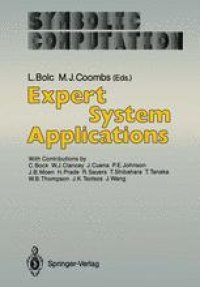
Ebook: Expert System Applications
- Tags: Artificial Intelligence (incl. Robotics)
- Series: Symbolic Computation
- Year: 1988
- Publisher: Springer-Verlag Berlin Heidelberg
- Edition: 1
- Language: English
- pdf
While expert systems technology originated in the United States, its development has become an international concern. Since the start of the DENDRAL project at Stanford University over 15 years ago, with its objective of problem-solving via the automation of actual human expert knowledge, significant expert systems projects have been completed in countries rang ing from Japan to France, Spain to China. This book presents a sample of five such projects, along with four substantial reports of mature studies from North American researchers. Two important issues of expert system design permeate the papers in this volume. The first concerns the incorporation of substantial numeric knowledge into a system. This has become a significant focus of work as researchers have sought to apply expert systems tech nology to complex, real-world domains already subject to statistical or algebraic description (and handled well at some level in numeric terms). A second prominent issue is that of representing control knowledge in a manner which is both explicit, and thus available for inspection, and compatible with the semantics of the problem domain.
The volume presents an international collection of mature expert system projects. Work from countries ranging from Japan to France, Spain to China, and from the United States is reported. Following on the second stage of expert system development, discussion focusses on issues that have become prominent through the application of systems to real-world problems. The incorporation of substantial numeric knowledge into systems is the first issue covered. It arises in many technical domains, which are likely to have already been subject to statistical or algebraic description. The second issue concerns the explicit representation of control knowledge within knowledge-bases. This gives systems the capability of explicitly reasoning about the control strategy applicable to each sub-problem arising in a complex problem domain.
The volume presents an international collection of mature expert system projects. Work from countries ranging from Japan to France, Spain to China, and from the United States is reported. Following on the second stage of expert system development, discussion focusses on issues that have become prominent through the application of systems to real-world problems. The incorporation of substantial numeric knowledge into systems is the first issue covered. It arises in many technical domains, which are likely to have already been subject to statistical or algebraic description. The second issue concerns the explicit representation of control knowledge within knowledge-bases. This gives systems the capability of explicitly reasoning about the control strategy applicable to each sub-problem arising in a complex problem domain.
Content:
Front Matter....Pages I-IX
Representing Control Knowledge as Abstract Tasks and Metarules....Pages 1-77
Controlling Expert Systems....Pages 79-197
A Quantitative Approach to Approximate Reasoning in Rule-based Expert Systems....Pages 199-256
Structural Analysis of Electronic Circuits in a Deductive System....Pages 257-308
Building Expert Systems Based on Simulation Models: An Essay in Methodology....Pages 309-359
An Approach to Designing an Expert System Through Knowledge Organization....Pages 361-393
Garden Path Errors in Diagnostic Reasoning....Pages 395-427
Knowledge Organization and Its Role in Temporal and Causal Signal Understanding: The ALVEN and CAA Projects....Pages 429-468
Back Matter....Pages 469-471
The volume presents an international collection of mature expert system projects. Work from countries ranging from Japan to France, Spain to China, and from the United States is reported. Following on the second stage of expert system development, discussion focusses on issues that have become prominent through the application of systems to real-world problems. The incorporation of substantial numeric knowledge into systems is the first issue covered. It arises in many technical domains, which are likely to have already been subject to statistical or algebraic description. The second issue concerns the explicit representation of control knowledge within knowledge-bases. This gives systems the capability of explicitly reasoning about the control strategy applicable to each sub-problem arising in a complex problem domain.
Content:
Front Matter....Pages I-IX
Representing Control Knowledge as Abstract Tasks and Metarules....Pages 1-77
Controlling Expert Systems....Pages 79-197
A Quantitative Approach to Approximate Reasoning in Rule-based Expert Systems....Pages 199-256
Structural Analysis of Electronic Circuits in a Deductive System....Pages 257-308
Building Expert Systems Based on Simulation Models: An Essay in Methodology....Pages 309-359
An Approach to Designing an Expert System Through Knowledge Organization....Pages 361-393
Garden Path Errors in Diagnostic Reasoning....Pages 395-427
Knowledge Organization and Its Role in Temporal and Causal Signal Understanding: The ALVEN and CAA Projects....Pages 429-468
Back Matter....Pages 469-471
....